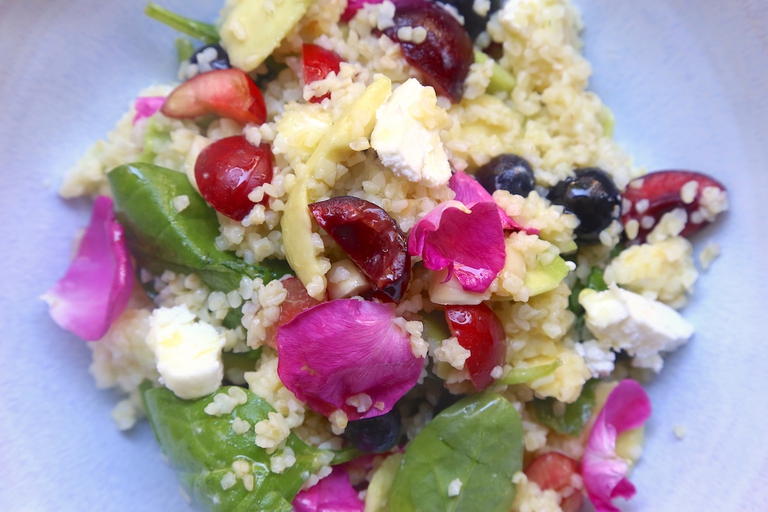https://www.lifegate.it/bulgur
- |
- Bulgur comes from Turkey to enrich our recipes and, thanks to its nutritional aspects, to promote well-being.
- Boasting an appreciable and delicate aroma, it is a good ingredient for various recipes.
- By virtue of its characteristics, it is a healthy food, as it brings various benefits.
Bulgur is an interesting alternative to more classic carbohydrate sources, such as rice.It's about broken durum wheat, which is steamed, dried and ground.Originally from Turkish land, is a cereal that boasts a certain "antiquity", although it occupies a very respectable place in modern and Western cuisine.Its consumption fits perfectly into the Mediterranean-style diet, making it functional to overall well-beingor.Bulgur does not lack, among other things, a certain versatility in the kitchen, adapting to summer or winter preparations.

Nutritional values
Considering a standard quantity of one hundred grams, bulgur provides 75.9 g of carbohydrates (of which 0.41 g of sugars) and 12.3 g of vegetable proteins.The latter, among other things, have an intermediate biological value.The lipid quota, composed mainly of unsaturated fats, corresponds to approximately 1.33 g.Taking into account the composition in macronutrients, the energy value of one hundred grams amounts to approximately 342 kcal.Water is present in the food in small quantities (9 g), while the fiber intake is significant, which is equal to 12.5 g.
Among them vitamins of bulgur include those of group B, such as niacin, thiamine, riboflavin and vitamin B6.Total folate amounts to 27 µg per 100 of the food.THE micronutrients also include calcium (35 mg), magnesium (164 mg), potassium (410 mg), iron (2.46 mg) and zinc (1.93 mg).
Properties and benefits
Consume bulgur in the context of a varied diet, in quantities suited to energy needs and with the right rotation of carbohydrate sources, aligns with optimal nutrition, promoting various aspects of health.By virtue of thecontribution of fiber, especially insoluble, is a panacea for the intestinal regularity, as well as for the bacterial flora that populates the intestine.Due to its fiber content, bulgur has a positive effect on the sense of satiety, so it cannot be excluded as part of a low-calorie diet, provided it is consumed in adequate quantities.A balanced intake of this cereal is also compatible with the diet of diabetic patient, considering a rather moderate glycemic index.Bulgur contains some well-known substances antioxidant power, such as lutein, epicatechin and gallic acid.It is therefore useful to counterbalance the action of free radicals, where the overall diet is also oriented in this direction.Due to its supply of folates and B vitamins, bulgur is a suitable food during pregnancy pregnancy.
How much bulgur to eat
Bulgur falls into the larger group of cereals and derivatives.The guidelines for healthy eating, in this regard, recommend a daily quantity of approximately eighty grams.However, portions may vary depending on the individual, taking into account nutritional needs, dietary habits, any pathologies, etc.Generally speaking, this is preferable alternate it with other cereals, and place it in the context of a complete diet.
How to use bulgur in cooking and where to find it
To appreciate it best, it is preferable to consume it immediately after cooking in boiling water, which takes no more than a quarter of an hour.Generally speaking, present a characteristic aroma, delicate and slightly sweet, vaguely overlapping that of hazelnuts.The most classic recipes, especially suitable for the cold season, include adding bulgur to soups, alone or together with other cereals and pseudocereals, such as spelt, buckwheat and quinoa.In any case, it is a quite versatile food, so it can also be used in the most summery preparations, and therefore cold, always after cooking.In this case, it is possible to add it to rice salads and combine it with the most disparate vegetables, but also with cold legumes and animal protein sources, such as chicken or tuna.The combination with legumes is also useful for the preparation of burgers and meatballs, undoubtedly popular among vegans and vegetarians.Bulgur is effectively seasoned with raw extra virgin olive oil, but also with various herbs and spices, such as ginger, turmeric, saffron And paprika.
Bulgur can easily replace the couscous in recipes that require it, although the two foods differ in the processing method and in the seeds of origin, which for bulgur are integral.Since it is, perhaps, a more "niche" food than others, bulgur it is not always available immediately.Generally, it is preferable to go to larger outlets, organic product shops and, sometimes, herbalist shops.
Contraindications
Being made of whole wheat, contains gluten.Intuitively, therefore, it is a food not suitable for people with celiac disease or allergies to wheat.The same criterion is applied in case of non-celiac gluten sensitivity, although not to an irreversible extent, this problem in fact involves the gradual reintroduction of foods containing gluten.
FAQs
What benefits does bulgur have?
It is good for the intestine, as it promotes intestinal regularity and contributes to the health of the microbiota.In appropriate quantities and ways, it can be consumed by diabetics, as well as by people who wish to control their body weight.Bulgur is a food antioxidant and is also indicated during pregnancy.
What is the difference between couscous and bulgur?
Couscous and bulgur have some differences.The production process, for example, is different, as are the starting seeds, which, in the case of bulgur, are always wholemeal.
What does bulgur taste like?
It has an aroma similar to that of hazelnut and is, at times, sweetish.Overall, its flavor remains delicate and does not cover that of other dishes.
Who can't eat bulgur?
Bulgur is contraindicated for people with celiac disease or allergies to wheat.In a non-irreversible way, bulgur is excluded even in the presence of non-celiac gluten sensitivity.
Where can you find bulgur?
You can buy it at larger stores, but also at organic food shops and herbalist's shops.

